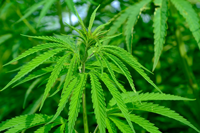
Written by: John Stewart | October 10, 2019
 Now that the 2018 Farm Bill has removed hemp as a schedule 1 controlled substance and listed it as an agricultural commodity, making it legal for farmers to grow the crop for industrial uses in states that permit it, some are wondering: can hemp products be used in feed or pet food? At this time, the answer is no. But given growing consumer interest, our members and even some state regulatory bodies are asking us this question.
Now that the 2018 Farm Bill has removed hemp as a schedule 1 controlled substance and listed it as an agricultural commodity, making it legal for farmers to grow the crop for industrial uses in states that permit it, some are wondering: can hemp products be used in feed or pet food? At this time, the answer is no. But given growing consumer interest, our members and even some state regulatory bodies are asking us this question.
Though some might mistakenly associate the cannabis plant with marijuana, hemp actually lacks the key ingredient – THC – that makes a person high. In fact, producing a plant with higher than 0.3 percent THC content of dry matter would be illegal. For agricultural purposes, when we talk about hemp, we are mainly talking about using the entirety of the plant – such as its leaves or seeds – or its coproducts – cannabidiol (CBD) oil. Among its many uses, as CBD Origin notes in its infographic, hemp’s fiber content, unique omega-3 fatty acid and protein profile is being considered by the animal food industry for multiple intended uses in diets for livestock and pets.
Over the past several months, the U.S. Department of Agriculture and Food and Drug Administration has grappled with how to regulate this crop at the federal level, especially in light of the fact that the market for hemp products continues to grow, as seen in the Farm Bureau’s graphic below. With a majority of states moving forward with programs to support hemp farmers, the issue of whether manufacturers can legally use the resulting end products in feed or pet food has come up.
.png)
For example, the Florida Department of Agriculture and Consumer Services is considering a proposed rule that would allow hemp extract to be used in Florida’s pet food. In a July letter to the department’s commissioner, the American Feed Industry Association explained that this action could have unintended consequences, as neither the FDA or the Association of American Feed Control Officials (AAFCO) have reviewed hemp products for use in animal food.
“AFIA has major concerns with feeding livestock or pets industrial hemp as an unapproved food animal product, which could be considered an ‘adulterant’ to animal food. If considered an adulterant, the products could not be sold across state lines, causing a patchwork of state laws on its use.”
AFIA has advised its members, when encountering these situations within their states, to defer to AAFCO’s hemp policy. AAFCO has been working on the hemp issue for the past four years and has asked the hemp industry to provide scientific information so that it could establish definitions for ingredients derived from the hemp plant (e.g., hemp seed oil, hemp seed meal and whole hemp seeds). These definitions are then incorporated into the Official Publication, which is the legal listing states use to allow ingredients on commercial feed labels. As of August, AAFCO said that had not yet happened.
“Although there are private companies and organizations working on applications, to date, the industry has not submitted any data showing that ingredients derived from the hemp plant are safe and useful in animal food. AAFCO is encouraging the industry to submit their data promptly.”
What all of this boils down to for the animal food industry is this – the hemp industry needs to provide more research to prove these ingredients are safe for use and the proper regulatory bodies need to approve them before they can be used in feed or pet food. This is the same process for any new ingredient before it can be used in animal food.
As the American Veterinary Medical Association pointed out to the FDA in July, consideration should be given to ensure that if hemp products are incorporated into feed for food-producing animals, that there aren’t human health risks for eating the resulting meat, poultry, eggs, milk and other animal products. Further, the veterinary community cautioned against their use in pet food and feed until the FDA completes its safety and efficacy review.
So where does this leave us?
At AFIA, we are watching this issue closely to ensure that any state bills or regulations that pop up are consistent with federal law, do not generate unintended consequences or restrict the flow of goods in interstate commerce. Until products get approved, we will continue to advise our members of the AAFCO hemp policy.
This article was updated on Oct. 16, 2019.
Comments See our policy on comments